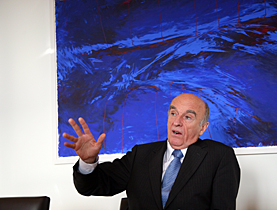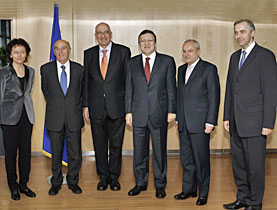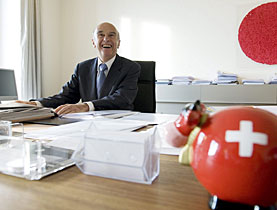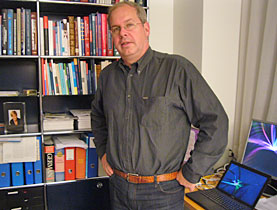Merz calls for fairness in Swiss politics

The 2009 Swiss president, Hans-Rudolf Merz, says that in its policies Switzerland should remain "determined" but "fair".
Merz, who has been head of the finance ministry since the beginning of 2004, tells swissinfo why action had to be taken to inject money into the country’s largest bank, UBS, and the Swiss economy.
The 66-year-old, who has made a speedy recovery from a quintuple heart bypass operation in September, added that the continuing pressure on Switzerland’s banking secrecy was “a reality that we have to accept”.
swissinfo: Swiss domestic politics was characterised by toughness with opponents in 2008. Will the political climate improve?
Hans-Rudolf Merz: It is true there was a time when we didn’t talk without mincing words, and that’s regrettable. But then again you have to understand that politics obviously isn’t like being at Sunday school.
Politics is all about debating conflicting ideas. It is essential that in a democratic system we discuss these ideas. But this has to happen in a fair way. I hope in my year as president that we can also show determination in external matters and that we can be fair in the way we do this.
swissinfo: There’s been a crisis among the banks, particularly at Switzerland’s largest financial institution, UBS, what has gone wrong?
H-R.M.: The Swiss banks were not alone in suffering from the [United States subprime] mortgage crisis. They were in good company. That means that other countries and their regulatory bodies also did not see what was coming or only noticed too late.
Globalisation and particularly the internet have led to a situation in which large financial transactions can, in a matter of seconds, be transferred from one capital market to another, and be changed from one currency to another, without a regulatory body having the possibility to see what is going on.
When it comes to the transport of goods, we have several means to see what is happening. We have customs declarations, production certificates, orders and accounts. Globalisation has not led to a situation where goods can be moved around without knowledge.
But we have to get a grip on financial flows that we do not know about. Regulation has to be carried out at an international level.
swissinfo: The state has had to pump SFr66 billion ($62.76 billion) into the economy. Doesn’t that bother you as finance minister?
H-R.M.: I am a supporter of the free market economy and liberal. In a way, it’s up to the economy to help itself. The economy also has to stay competitive. In that sense, it upsets me very much what is happening.
But then again it is an appreciation of values and I believe that the interest of the country has priority. UBS has become so big that a collapse would have incalculable and very real effects on not only Switzerland as a financial centre but also on the economy as a whole. In that situation, we were forced to take action.
swissinfo: In a tax dispute with the European Union, Switzerland has made some concessions. But the EU wants more. Do you expect further attacks on banking secrecy in 2009?
H-R.M.: Banking secrecy is constantly under pressure. It’s a reality that we have to accept. But I am convinced that banking secrecy is always falsely interpreted. It is not absolute. We do not tolerate tax fraud.
Banking secrecy is the protection of personal privacy. I do not want a situation in which when I pay my taxes honestly, the state sniffs into my bank accounts. I want to keep this privacy. It’s a legitimate demand.
We have offered several solutions: The most important is the withholding tax accord with the EU. We pledged to tax the interest of EU residents with Swiss accounts at a rate of 35 per cent, which is then returned to the tax authorities of the EU countries concerned.
Foreign states are not really interested in privacy. They are concerned that money is taxed and I have every understanding for that.
The EU has realised that this withholding tax has proved its value. We also want to move forward with non-EU countries in the same way.
swissinfo: Do you believe that you can also fend off EU attacks against the tax sovereignty of Swiss cantons?
H-R.M.: Yes. In the tax dispute I am somewhere in the middle. Brussels says we are moving in the right direction but we haven’t reached the destination. The cantons and political parties say the same. But everyone is pushing in a different way. These are centrifugal forces. For me that means that my approach is the right one.
swissinfo: You are at an age when you could retire and travel around the world instead of being in the firing line. What makes you want to stay in office?
H-R.M.: I don’t have big travel plans because I’ve already travelled extensively. I have reached a point where there are many projects that have grown up with me and when there are deadlines to respect.
I’ve had a really serious illness, a cardiac arrest. Medical treatment always aims to make the patient able to work again. And if – as in my case – it works, then I believe you should return to work, which I did.
I’m in the best of health. I was fit before this accident and now I am perhaps fitter because my heart is functioning well again. So, it’s clear for me that this is the natural course.
And I’ve always said that I would retire in 2011 at the latest. A second period in the government is legitimate because one alone is not enough to bring some issues to a successful end. I have not achieved yet everything that I wanted to.
swissinfo: Will electronic voting become a reality for the Swiss abroad during your year as president?
H-R.M.: We are aiming for this and I hope that we can make progress. It is not just up to me. There are issues that concern people’s rights and there are technical problems. But I think we must support this general trend.
swissinfo-interview: Andreas Keiser
Merz succeeded Kaspar Villiger in government at the beginning of 2004 representing the centre-right Radical Party.
He took over from Villiger as head of the finance ministry.
Previously, Merz was a member of the Swiss Senate representing the canton of Appenzell Outer Rhodes.
He studied at St Gallen University, completing his studies with a dissertation on the subject of “Financial assets and administrative assets from the standpoint of public law and economics”.
Between 1967 and 1969, he also held the post of assistant lecturer at the Institute of Public Finance and Fiscal Law at St Gallen University.
Merz, aged 66, is married and has three sons.

In compliance with the JTI standards
More: SWI swissinfo.ch certified by the Journalism Trust Initiative



You can find an overview of ongoing debates with our journalists here. Please join us!
If you want to start a conversation about a topic raised in this article or want to report factual errors, email us at english@swissinfo.ch.